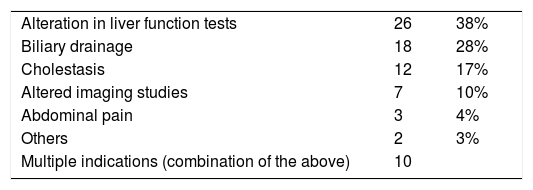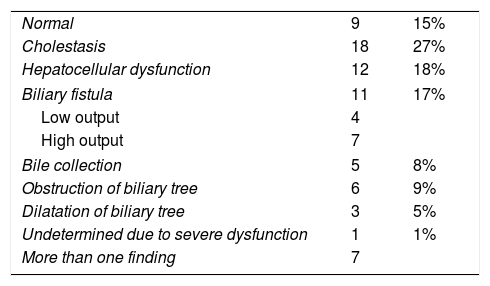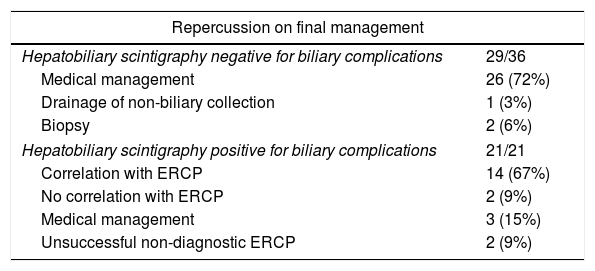To show the experience of the use of hepatobiliary scintigraphy in patients with suspected complications after liver transplantation in a high complexity center.
Material and methodRetrospective, observational and descriptive study. All consecutive adult patients with liver transplantation between January 2013 and February 2018 were included, with one or more hepatobiliary scintigraphy during the early or late postoperative period. A total of 58 studies were analyzed in 38 patients (22 men and 16 women). Mean age: 48 years. In 34/38: cadaverous donor (89%), and in 4 (11%): a living donor. Demographic data and relevant information regarding the transplant were obtained, and the result was related to the surgical findings to determine the correlation between them. The influence of the test on the final clinical decisions was evaluated.
ResultsFindings: 9 scans (14%) were normal, 36 studies were negative, and 21 were positive for biliary complications. Of the total of 58 studies, 50 (86%) had impact on the clinical behavior of observation or intervention. All the patients with findings of biliary complications (21/21; 100%) had clinical repercussion since 18/21 patients were taken to invasive studies or treatments, and 3/21 patients continued in medical management for findings of non-surgical biliary complications. In 14/18 patients taken to studies or procedures, correlation was found with the scintigraphic study. In 24/36 (66%) of patients with negative scintigraphy, an impact on clinical behavior was found.
ConclusionHepatobiliary scintigraphy is a simple, non-invasive, reliable, current and available form for the early study of biliary complications in patients with liver transplantation. Important hepatocellular dysfunction should be taken into account as a frequent cause of false negative studies.
Mostrar la experiencia del uso de la gammagrafía hepatobiliar en pacientes con sospecha de complicaciones biliares postrasplante hepático en un centro de alta complejidad.
Material y métodoEstudio retrospectivo, observacional y descriptivo. Se incluyeron todos los pacientes consecutivos adultos con trasplante hepático entre enero de 2013 y febrero de 2018, con una o más gammagrafías hepatobiliares durante el postoperatorio temprano o tardío. Se analizaron un total de 58 gammagrafías hepatobiliares en 38 pacientes (22 hombres y 16 mujeres). Edad media: 48 años. En 34/38: donante cadavérico (89%), y en 4 (11%): donante vivo. Se obtuvieron otros datos demográficos e información relevante respecto al trasplante y se relacionó el resultado con los hallazgos quirúrgicos para determinar la correlación entre ambos. Se evaluó la influencia de la prueba en las decisiones clínicas finales.
ResultadosHallazgos: 9 gammagrafías hepatobiliares (14%) fueron normales, 36 fueron negativas y 21 fueron positivas para complicaciones biliares. Del total de las 58 gammagrafías hepatobiliares, 50 (86%) tuvieron repercusión en la conducta clínica de observación o intervención. En todos los pacientes con hallazgos de complicaciones biliares (21/21; 100%) hubo una repercusión clínica, ya que a 18/21 se les realizaron estudios o tratamientos invasivos y 3/21 pacientes continuaron en manejo médico por hallazgos de complicaciones biliares no quirúrgicas. En 14/18 pacientes a los que se realizó estudios o procedimientos se encontró correlación con el estudio gammagráfico. En 24/36 (66%) pacientes con una gammagrafía hepatobiliar negativa se encontró impacto en la conducta clínica.
ConclusiónLa gammagrafía hepatobiliar es una forma simple, no invasiva, confiable, vigente y disponible para el estudio de forma temprana de las complicaciones biliares en pacientes con trasplante hepático. Se debe tener en cuenta la disfunción hepatocelular importante como causa frecuente de obtener estudios falsos negativos.
Article
If you experience access problems, you can contact the SEMNIM Technical Secretariat by email at secretaria.tecnica@semnim.es or by phone at +34 619 594 780.

Revista Española de Medicina Nuclear e Imagen Molecular (English Edition)










